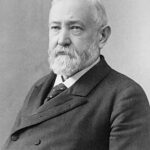Revolutionary Trade Legislation
President Benjamin Harrison signed the McKinley Tariff Act on October 1, 1890. This groundbreaking legislation raised average tariff rates to 48.4 percent on imported goods. However, the McKinley Tariff Act included an innovative reciprocal trade provision that transformed American commercial diplomacy. 📊
The Decision Behind Reciprocal Trade
Harrison and Secretary of State James G. Blaine crafted a strategic approach to international commerce. The act empowered the president to negotiate mutual tariff reductions with willing trading partners. This marked America’s first major departure from purely protectionist policies toward flexible trade relationships. 💰
Implementation Strategy
The reciprocal trade provisions specifically targeted Latin American markets for American agricultural products. Harrison could impose duties on sugar, molasses, tea, coffee, and hides from non-cooperative nations. Conversely, he could offer preferential treatment to countries accepting American exports. This carrot-and-stick approach demonstrated sophisticated economic diplomacy. ⚠️
Impact:
Immediate Economic Consequences
The McKinley Tariff Act generated significant revenue increases for the federal government initially. American manufacturers benefited from enhanced protection against foreign competition. However, consumer prices rose substantially, creating public discontent. The reciprocal trade provisions proved more successful than the high tariff rates themselves. 📉
Diplomatic Achievements
Harrison successfully negotiated reciprocal trade agreements with several Latin American nations including Brazil, Spain, and Britain. These agreements opened new markets for American agricultural exports, particularly wheat and pork. The policy strengthened hemispheric relationships and demonstrated America’s growing diplomatic sophistication. 🌍
Long-term Historical Significance
The reciprocal trade concept pioneered by Harrison influenced future American trade policy for decades. Later presidents expanded these flexible approaches to international commerce. The McKinley Tariff Act established precedents for executive authority in trade negotiations. Modern trade agreements trace their origins to Harrison’s innovative 1890 legislation. Despite short-term political costs, historians praise the act’s forward-thinking approach to international economic relations. 🔥
